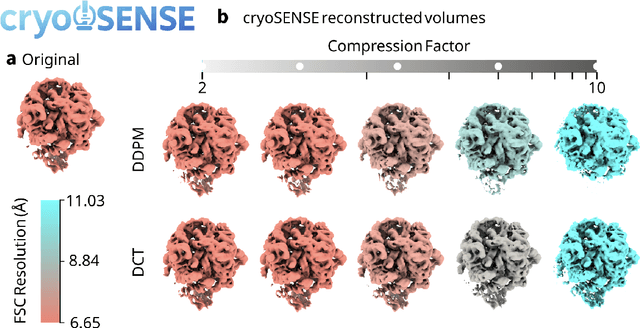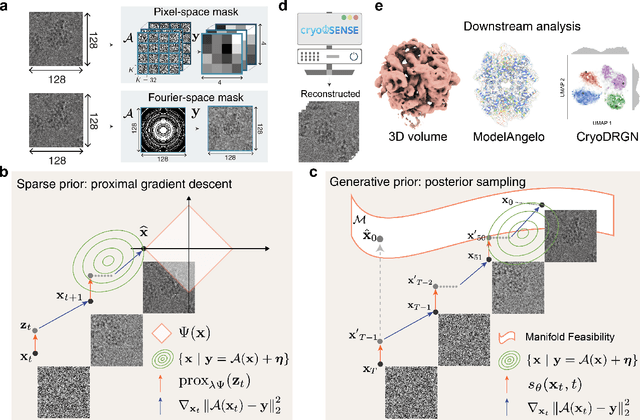Daniel Saeedi
cryoSENSE: Compressive Sensing Enables High-throughput Microscopy with Sparse and Generative Priors on the Protein Cryo-EM Image Manifold
Nov 18, 2025



Abstract:Cryo-electron microscopy (cryo-EM) enables the atomic-resolution visualization of biomolecules; however, modern direct detectors generate data volumes that far exceed the available storage and transfer bandwidth, thereby constraining practical throughput. We introduce cryoSENSE, the computational realization of a hardware-software co-designed framework for compressive cryo-EM sensing and acquisition. We show that cryo-EM images of proteins lie on low-dimensional manifolds that can be independently represented using sparse priors in predefined bases and generative priors captured by a denoising diffusion model. cryoSENSE leverages these low-dimensional manifolds to enable faithful image reconstruction from spatial and Fourier-domain undersampled measurements while preserving downstream structural resolution. In experiments, cryoSENSE increases acquisition throughput by up to 2.5$\times$ while retaining the original 3D resolution, offering controllable trade-offs between the number of masked measurements and the level of downsampling. Sparse priors favor faithful reconstruction from Fourier-domain measurements and moderate compression, whereas generative diffusion priors achieve accurate recovery from pixel-domain measurements and more severe undersampling. Project website: https://cryosense.github.io.
AstroAgents: A Multi-Agent AI for Hypothesis Generation from Mass Spectrometry Data
Mar 29, 2025Abstract:With upcoming sample return missions across the solar system and the increasing availability of mass spectrometry data, there is an urgent need for methods that analyze such data within the context of existing astrobiology literature and generate plausible hypotheses regarding the emergence of life on Earth. Hypothesis generation from mass spectrometry data is challenging due to factors such as environmental contaminants, the complexity of spectral peaks, and difficulties in cross-matching these peaks with prior studies. To address these challenges, we introduce AstroAgents, a large language model-based, multi-agent AI system for hypothesis generation from mass spectrometry data. AstroAgents is structured around eight collaborative agents: a data analyst, a planner, three domain scientists, an accumulator, a literature reviewer, and a critic. The system processes mass spectrometry data alongside user-provided research papers. The data analyst interprets the data, and the planner delegates specific segments to the scientist agents for in-depth exploration. The accumulator then collects and deduplicates the generated hypotheses, and the literature reviewer identifies relevant literature using Semantic Scholar. The critic evaluates the hypotheses, offering rigorous suggestions for improvement. To assess AstroAgents, an astrobiology expert evaluated the novelty and plausibility of more than a hundred hypotheses generated from data obtained from eight meteorites and ten soil samples. Of these hypotheses, 36% were identified as plausible, and among those, 66% were novel. Project website: https://astroagents.github.io/
 Add to Chrome
Add to Chrome Add to Firefox
Add to Firefox Add to Edge
Add to Edge